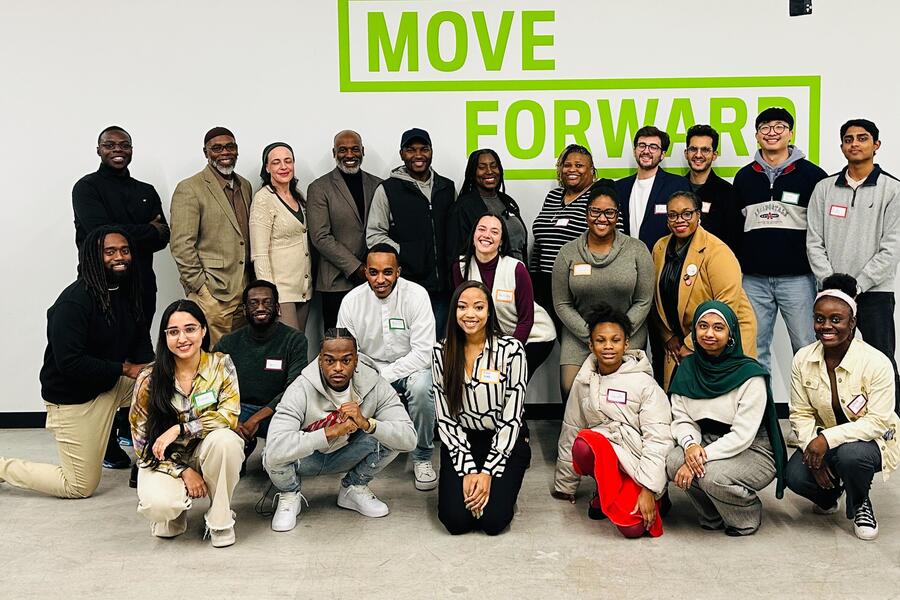The Pava Marie LaPere Center for Entrepreneurship recently launched its 2024 Social Innovation Lab (SIL) cohort with 15 entrepreneurial teams—an additional five teams this year for the lab's largest cohort since its inception in 2012.
The Social Innovation Lab recognizes and empowers innovators in the Baltimore area and is the only Pava Center accelerator open to both Johns Hopkins students and non-affiliates. Projects planned by members of the 2024 cohort include a youth education program focused on Black history, a parole and reentry program for incarcerated women, and an eco-friendly water pollution solution using algae and seaweed.
Cohorts accepted to the Social Innovation Lab receive access to a wide network of mentors, advisers, partners, and funders in Baltimore and beyond. Teams who complete the experience are eligible for a $5,000 grant stipend and the opportunity to win a $15,000 cohort prize.
The program continues to grow and received more than 100 applications this year, with more than half of the accepted community entrepreneurs received direct referrals from last year's cohort. Additionally, many founders apply after attending the bi-annual Impact Bootcamp, designed for social entrepreneurs ready to build or refine their customer discovery strategy and stakeholder map. Seventy percent of this year's cohort are Baltimore residents; 90% of the team members are people of color, nearly half are women, and there are multiple repeat applicants among the group.
"Our work cannot thrive without Baltimore and its people," said Sephora Saint-Armand, assistant director of the Pava Center. "The demand for our programming grows thanks to our alumni, organizational partners, and many others who champion social entrepreneurship."
Weekly programming for the cohort will begin in January, with additional monthly Saturday workshops known as 'SuperSaturdays' featuring hands-on exercises. For six months, cohort participants meet for curated workshops facilitated by Social Innovation Lab staff members or skilled individuals from the network. These sessions cover a broad range of concepts and walk founders through three themes: discover (clarifying the problem and the customer's interest in their solution), build (refining operational activities including financial planning and accounting), and sell (developing an effective sales strategy).
Session topics include customer discovery with a human-centered design lens, impact measurement and management, operational planning, revenue modeling, and more. Deliverables include strategic goal planning, logic modeling, business model canvassing, pitch decks, and refining financial documents.
Founders are also required to regularly participate in one-on-one meetings with assigned strategic advisers to assess their venture progress. They receive introductions to individuals in an extended network of community and Hopkins partners, alumni, and mentors.
"Participation in SIL is an immersive, hands-on experience that goes beyond traditional accelerator programs," said Anthony Watters, interim director of the Social Innovation Lab. "It's a journey of growth, both personally and professionally. The most valuable part of the experience is the connection you build with your fellow cohort members."
Meet the 2024 Social Innovation Lab cohort:
- Atwero: Provides assistive devices for a marginalized population in rural Uganda. The aim is to provide better access to improved sanitation facilities for people with disabilities across developing countries.
- B'More Designful: A design studio that bootstraps UX research and design efforts for early-stage startups led by underrepresented founders.
- Coach G Academy: Prepare young girls for post-graduate success with increased self-discipline and leadership through step dance.
- Crayons & Culture: Education solution for underserved youth with a culturally relevant curriculum model and community buy-in.
- CusQuest: A platform that connects skilled tradespeople with customers seeking reliable local services in the Baltimore area.
- Deepnosis: Leverages AI to personalize medication management by predicting adverse drug reactions based on individual health profiles, improving patient safety and outcomes.
- Eloquia: A digital technology that provides effective speech therapy for individuals with speech impediments with real-time, personalized feedback on speech progress.
- Evolving Minds: Workplace mental health solution that creates a culture for healthy and sustainable workforces.
- Financial Joy School: A virtual platform and game company that empowers players to build generational wealth through diverse financial education and investment tools.
- FreeMoneyMeister: Personalized scholarship coaching to help students win external scholarships to minimize student loan debt.
- Green Mechanics Benefit: Ecology-based technology that improves water pollution and other environmental challenges disproportionately impacting underserved communities.
- Jay's Watermelonade: Beverage startup on a mission to promote healthy hydration and prevent heart disease in Baltimore through preventative education and nutritious product offerings.
- Nan-e: A wearable that immediately soothes baby's cries hands-free.
- PREPARE:On a mission to ensure returning citizens have a successful parole experience with holistic reentry plans.
- SMTS Labs: Enhance social media trust and safety by utilizing Gen Z data to detect and prevent the widespread sharing of violent crimes.
Posted in University News








